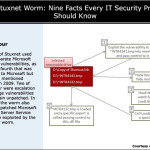Viruses, whether virtual or real, have impacted our lives. If the virus is well known, more likely it caused a lot of damage and grief to people around the world. Virtual viruses, like worms and trojans, have been known to corrupt or steal sensitive information from one’s computer. Here is one of the most well known computer viruses in the last century:
Love Letter/I LOVE YOU (2000)
Back in 2000, millions of people made the mistake of opening an innocent looking email attachment labeled simply, “I Love You.” Instead of revealing the heartfelt confession of a secret admirer, as perhaps readers had hoped, the file unleashed a malicious program that overwrote the users’ image files. Then like an old-fashioned chain letter gone nuclear, the virus e-mailed itself to the first 50 contacts in the user’s Windows address book. While by today’s standards, Love Letter is almost quaint, it did cause wide-scale problems for computer users. It only took hours for Love Letter to become a global pandemic, in part because it played on a fundamental human emotion: the desire to be loved. In that sense, Love Letter could be considered the first socially engineered computer virus.
Over a five-hour period, during May 4, 2000, this virus spread across Asia, Europe and the United States via e-mail messages titled “ILOVEYOU.” The menace clogged Web servers, overwrote personal files and caused corporate IT managers to shut down e-mail systems.
The virus started as a thesis proposal by Onel de Guzman, a student of AMA College Makati. Even though the project was rejected, a trojan e-mail called “ILOVEYOU” was sent and spread like wild fire. It has spread across the globe. Anyone could be a victim.
E-mailing have been the way of communicating with people around the world, disregarding social media like Facebook, as of late. A lot of people utilize e-mail not only for communication, but also for business related matters. A lot of spam messages are roaming around cyberspace and there could be a candidate for the next “ILOVEYOU” trojan e-mail.







